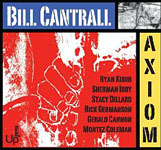Bill Cantrall, a very accomplished trombonist/composer, shows his many sides on his debut release as a leader. The members of the group are Ryan Kisor (trumpet), Sherman Irby (alto sax), Stacy Dillard (tenor sax), Rick Germanson (piano), Gerald Cannon (bass), and Montez Coleman (drums). Of Axiom's ten compositions, eight are penned by Cantrall: Porter's "After You" and Victor Shertzinger and Johnny Mercer's "Tangerine" complete the program.
The title piece, "Axiom," introduces the band and its ensemble sound. From the beginning, Cantrall allows the other musicians space to develop. Of the brass instrument, tenor saxophonist Dillard stands out. The rhythm section is dominated by Coleman with a neat little solo rendered by pianist Germanson. When Cantrall takes his trombone solo, a solid groove has paved the way and the listener expects interesting music from an interesting musician.
In addition to taking a couple undergraduate degrees from Northwestern University in Illinois, Cantrell apprenticed with Von Freeman, bandleader Rob Mazurek, and guitarist Jeff Parker while in the Midwest and, after working a bit with salsa bands, studied and learned from Sir Roland Hanna, at Queens College, and trumpeter Michael Philip Mossman. If this debut is an indication, Cantrell has learned his lessons well, lessons that well may have contributed to his technical mastery of the unwieldy trombone.
"Minor Transgression" is reminiscent of those Jazz Messenger hard bop pieces, with the reeds playing in unison and Blakey pumping up everyone with his rolling shots. In the linear notes, indeed, the writer alludes to the "classic tradition" of the Art Blakey groups. Getting back to the leader, Cantrall shows off both his blues chops and his melodic approach. From this point, the structure and arrangement of the program play no small parts.
The order of the program is thoughtful of the listener. Coming off the hard bop music, "Shanice" is a blues ballad, which Cantrall approaches lyrically. Bittersweet Shanice is a soft and easy blues that displays Cantrall's depth of feeling. In the next piece, the group gathers once more around the fire. "Torrent" opens with the bass out front, a little bit of the reeds, but mainly the drums and piano setting the pace. A difference between these players and the Messengers is the lyrical structure of the music. But then to play blues lyrically is not a contradiction. Yet with this piece, one feels the structuring of the music. Any drum solo is driving, neatly delivered, and brief; the pianist isn't intrusive. No musician takes a very long solo. Ensemble playing is the keynote - they play well together, particularly the fellowship of horns.
Variety marks the program and takes it into the pleasingly listenable realm. "Torrent" is followed by "After You," opening with piano, bass, and drum playing that bridges smoothly the successive solos by the horn players. The alto saxophonist delivers a lovely message, in essence "After You" love will go on. Following the fiery "Torrent," the piece seems more romantic than it probably is. "Like I Said" is straight ahead, with many a drum roll punctuating the breaks. It moves with that Messenger feel to it. The structure of the piece is very conducive to many improvisational explorations, and the group takes full advantage of them in the longest work of the program at just over ten minutes. "Halfway House" is another airy work that initiates a feeling of taking off, though the title suggests a period of brief rest. Again trumpeter Kisor takes the first solo after the break. The last piece worth mentioning is the last one in the program.
"Tangerine" concludes the music and the arrangement is very peppy and upbeat, played faster than usual. Cantrall displays his dexterity on trombone, and Coleman drives the other musicians flawlessly. So the program ends with high flying dance music, but the composition that sticks is "Minor Transgression."

